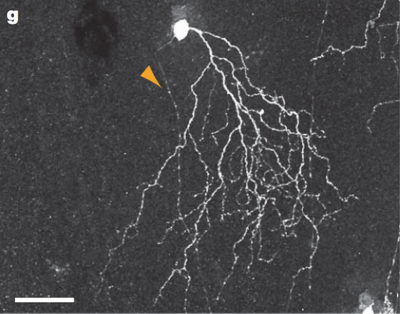Difference between revisions of "J-RGC"
(→Anatomy) |
(→Physiology) |
||
| Line 16: | Line 16: | ||
== Physiology == | == Physiology == | ||
| − | + | The receptive field of J-RGCs is unusual in that the integrated strength of its ON surround exceeds that of the OFF centre. (Kim et al.) | |
| − | + | ||
== Molecules == | == Molecules == | ||
Revision as of 12:26, 24 March 2012
JAM-B cells are a molecularly defined subcategory of retinal ganglion cell in mice which respond specifically to upward motion.
Contents
Introduction
JAM-B cells are named after Junctional Adhesion Molecule B, the molecular marker first used to define them as a distinct subset of retinal ganglion cells. JAM-B share many traits in addition to the presence of this molecule. They are all OFF RGCs, with asymmetric dendritic arbors aligned in a dorsal-to-ventral direction across the retina (source: Kim et al.) Their deepest importance to the study and categorization of cells in the retina lies in that they were the first RGC to be classified using a molecular marker.
Anatomy
One notable feature of JAM-B cells is a marked asymmetry in their dendritic arbors. More than 90 percent of the dendritic arbor lies on one side of the soma. Asymmetry of the dendritic arbor is an unusual feature for a Retinal Ganglion Cell, as the dendrites of most Retinal Ganglion Cells are symmetrical.
The dendrites of JAM-B cells have been found to arborize in a narrow band between processes of dopaminergic and cholinergic amacrines (source kim et al.)
Physiology
The receptive field of J-RGCs is unusual in that the integrated strength of its ON surround exceeds that of the OFF centre. (Kim et al.)
